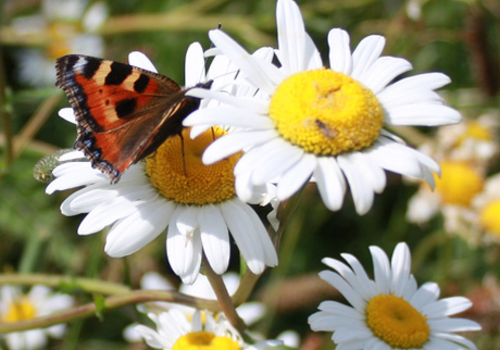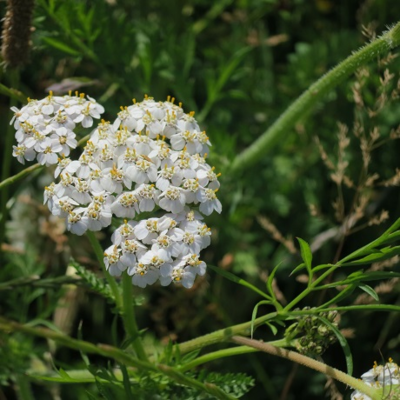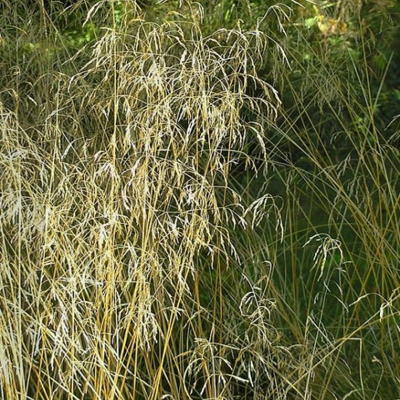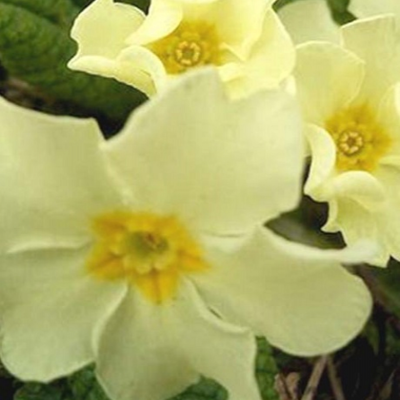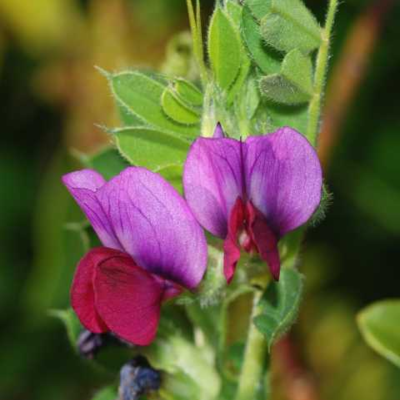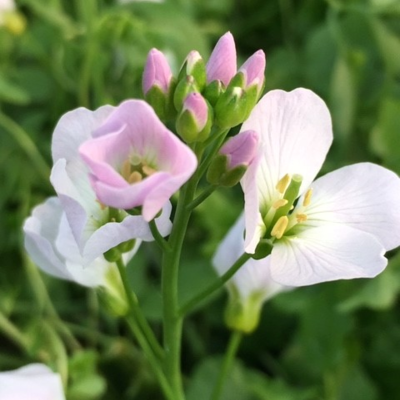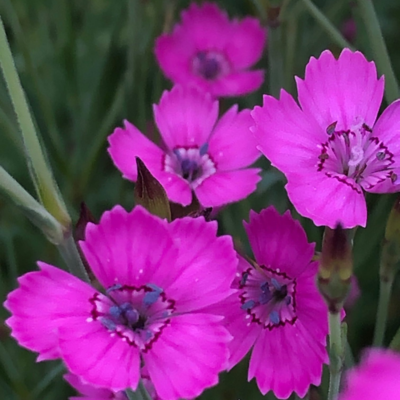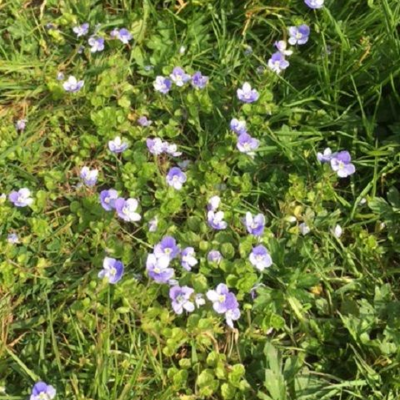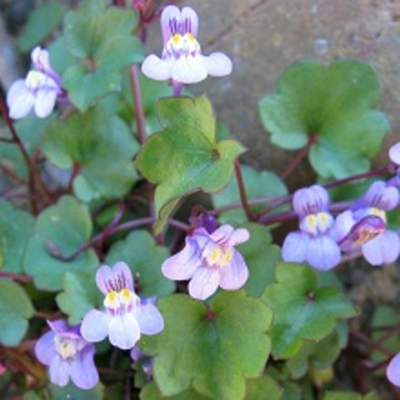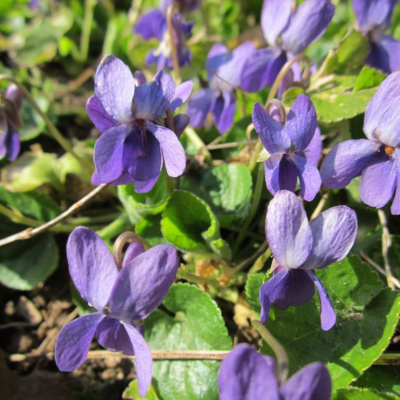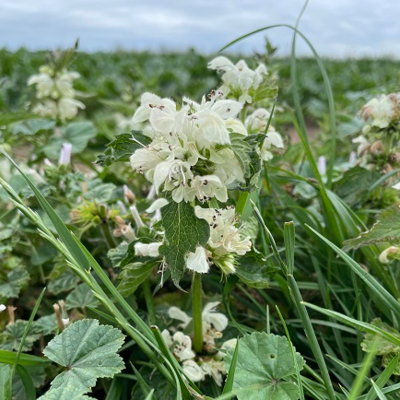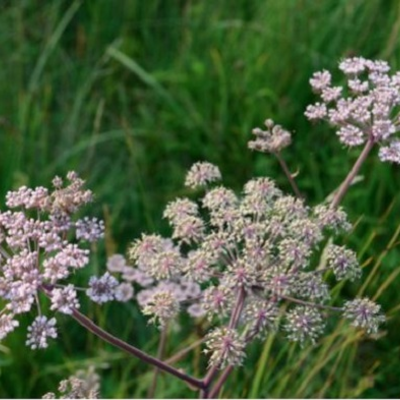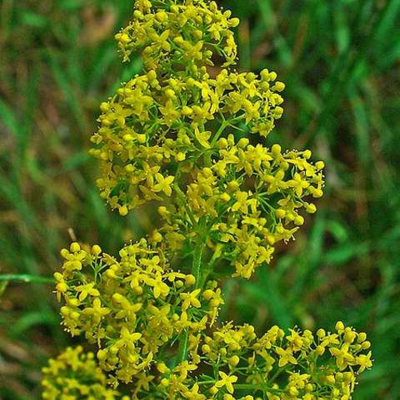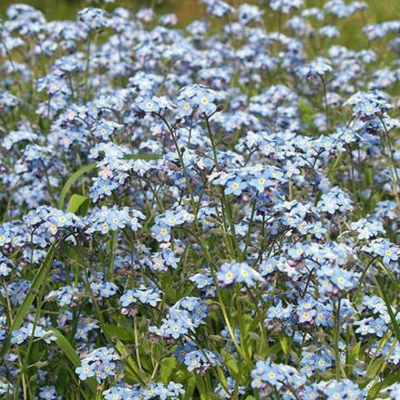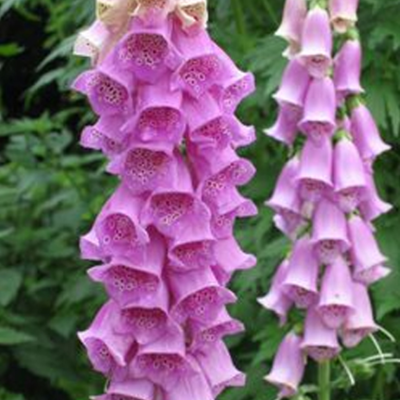Wildflower Plants A to Z
Choose from our entire range of over 100 wildflower plug plants, expertly grown in our very own nursery from high quality, UK native wildflower seed. Our wildflower plugs are ready to be planted straight out into your garden or meadow as soon as they arrive, all year round. Buying individual wildflower plants is one of the best ways to establish your chosen wildflower species, planted individually or as part of a more diverse meadow created from our range of wildflower seeds.
Don't hesitate to get in touch to speak to one of our experts or request a catalogue to view our full range. Ordering regularly or looking for large volumes? Click here to apply for a trade account today - we review all applications within one working day.
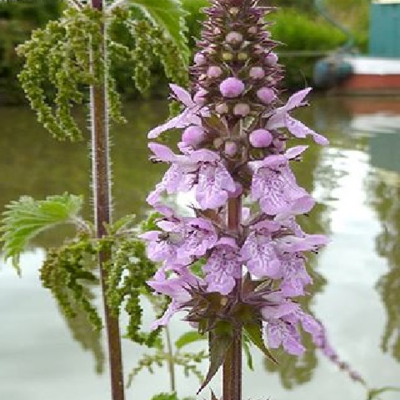

Plants for Pollinators highlights plants selected by the RHS as scientifically proven to tackle the declines in bees, butterflies and other pollinators.
With an array of purple and pink petals which attract bees, few pond-side plants are as pretty as these tall wetland wildflowers growing in whorls. Sports a darker crimson colouration on its lower lip and stem. An earnest plant which multiplies over the years; some might want to keep them in a container, or let them spill in rivers of rich-coloured, robust flowers.
- Type: Perennial
- Height: 30-75cm.
- Flowers: June-September
- Soil Requirement: Moist
- Light Requirement: Full sun or partial shade
- Natural Habitat: River banks, ditches, marshes
- Also known as: Clown’s Woundwort, Marsh Betony, Ploughman’s All-Heal

Plants for Pollinators highlights plants selected by the RHS as scientifically proven to tackle the declines in bees, butterflies and other pollinators.
An amazing addition to meadows, herb gardens and even lawns! There’s so much to love about this lacy cluster of feathery leaves and florets in white, pink and creamy yellow, we barely know where to start: it's exceptionally hardy, has a powerful aroma, and even outside of the garden, it’s been prized in herbalism for a staggeringly long time- it’s named after its role in Greek legend where the hero Achilles supposedly used it to treat his wounds.
- Type: Perennial
- Height: 40-55cm.
- Flowers: June-October
- Soil Requirement: Well-drained
- Light Requirement: Full sun
- Natural Habitat: Grassland, coastal areas, waste land
- Also known as: Lace Plant, Savory Tea, Thousand-Leaf
With a large, feather-like seed head, this tall ornamental tussock grass is perfect for attracting bees and other insects. Uniquely grooved, dark green leaves that form stiff rough clumps that form dense tufts that develop into distinctive tussocks.
- Type: Perennial
- Height: 30-120cm
- Flowers: June-August
- Soil requirement: Wet, poorly drained
- Light requirement: Partial sun and shade
- Natural habitat: Marshy fields, rough grassland and woodland
- Also known as: Tussock Grass

Plants for Pollinators highlights plants selected by the RHS as scientifically proven to tackle the declines in bees, butterflies and other pollinators.
The Wild Primrose’s pale yellow, five-petalled flowers are a cottage classic! Its light colouration is a delight under trees and bushes- just imagine a shady spot illuminated by sweet-scented, hardy clusters of buttery beauty!
- Type: Perennial
- Height: 20-30cm.
- Flowers: February-May
- Soil Requirement: Moist but well-drained
- Light Requirement: Full sun or partial shade
- Natural Habitat: Woodland, grassland
- Also known as: Culver Keys, Suncups

Plants for Pollinators highlights plants selected by the RHS as scientifically proven to tackle the declines in bees, butterflies and other pollinators.
These climbing woodland legumes have an earnest and delicate charm not seen in others of its kind: its small, two-tone, pea-like petals in rich pink and purple look a bit like butterflies, which may be why they're so attractive to pollinators.
- Type: Annual
- Height: 45–75cm.
- Flowers: June-September
- Soil Requirement: Well-drained
- Light Requirement: Full sun
- Natural Habitat: Grasslands, verges, coastal areas
- Also known as: Fetch, Lintels
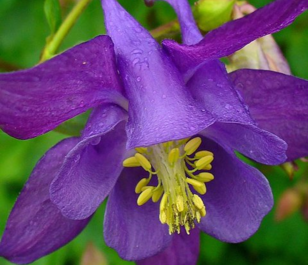

Plants for Pollinators highlights plants selected by the RHS as scientifically proven to tackle the declines in bees, butterflies and other pollinators.
The beautiful, nodding, bell-shaped blooms of the Columbine flower come in a variety of colours, even bi-coloured, though the most common colour in the wild is a vivid blue-violet, contrasted by a shining stamen the colour of honey, which is attractive to bees and butterflies. A cute cottage classic, perfect for pots, beds and borders, as it’s easy to grow and naturalise, though it dislikes being too dry.
- Type: Perennial
- Height: 45–60cm
- Flowers: June-July
- Soil Requirement: Moist but well-drained
- Light Requirement: Full sun or partial shade
- Natural Habitat: Woodlands, roadsides, grasslands
- Also known as: Dove Plant, Lady’s Shoes, Pigeon Foot
This item is currently unavailable

Plants for Pollinators highlights plants selected by the RHS as scientifically proven to tackle the declines in bees, butterflies and other pollinators.
Produces rosettes of leaves at the base of the stem leading up to its four pale pink petals. A flower that captures the essence of springtime; it's named because it blooms the same time you'd start to hear a Cuckoo's call.
- Type: Perennial
- Height: 30 – 50cm.
- Flowers: April - June
- Soil Requirement: Moist but well-drained
- Light Requirement: Full sun or partial shade
- Natural Habitat: Damp meadows, pond margins, riverbanks
- Also known as: Lady's-Smock, Cuckoo Bread, Mayflower
This item is currently unavailable
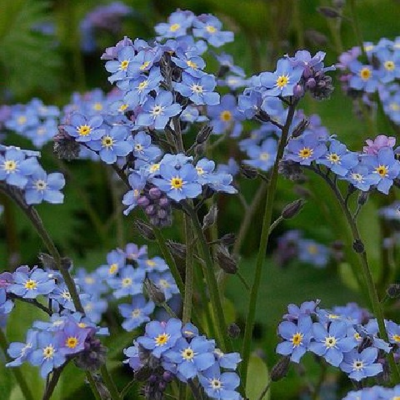

Plants for Pollinators highlights plants selected by the RHS as scientifically proven to tackle the declines in bees, butterflies and other pollinators.
These showy azure blue flowers consist of 5 petals with either a white or an orangery/yellow star shaped centre. An excellent plant for pollinators, for their nectar and pollen.
- Type: Perennial
- Height: 15-30cm.
- Flowers: April-July
- Soil Requirement: Moist, well drained soils
- Light Requirement: Semi shade
- Natural Habitat: Woodland, wet woods, hedgerows
- Also known as: Garden Forget-Me-Not
This item is currently unavailable
The county flower of Roxburghshire is certainly well-named, as its toothy, cerise pink flowers with deep-rose central markings are among our most vivid, and carry all the allure of a fairytale maiden. Recommended for rockeries, this bloom's beauty is easy to get lost in, growing in clusters in a mat of dark silver-green foliage.
- Type: Perennial
- Height: 10-15cm.
- Flowers: May-August
- Soil requirement: Well-drained
- Light requirement: Full sun
- Natural habitat: Hillsides, pastures, dry banks
- Also known as: Lady's Cushion, Meadow Pink, Spink
This item is currently unavailable
A low-growing, creeping beauty that thrives at woodland edges, but also makes for a unique lawn subject- not many other common flowers can compare to these small spikes of azure petals shining in the sun and bringing a little of the blue sky’s beauty down to earth for your garden!
- Type: Perennial
- Height: 10-20cm.
- Flowers: April-July
- Soil Requirement: Moist but well-drained
- Light Requirement: Full sun or partial shade
- Natural Habitat: Roadsides, woodland, grassland
- Also known as: Angels’ Eyes, Blue Stars
This item is currently unavailable
-
These low, trailing plants are recommended for rockeries, containers or garden walls, where they’re sure to delight with small, snapdragon-like flowers in mauve and yellow. So-named for its ivy-shaped leaves edged with red, there’s a certain magic to these miniature blooms- in bulk, they resemble a whimsical fairy village! A hardy climbing plant for those who want to add a splash of colour to a covered crevice.
- Type: Perennial
- Height: 5-10cm.
- Flowers: June-October
- Soil Requirement: Well-drained
- Light Requirement: Full sun or partial shade
- Natural Habitat: Cliff faces, coastal areas, grasslands
- Also known as: Climbing Sailor, Mother Of Thousands, Oxford Ivy
This item is currently unavailable
These famous five-petalled flowers are so beloved that they’ve named their own colour after their beautiful purple colouration. Not only that, but they’re shade-tolerant, making them the perfect plant to sweeten woodland gardens or under hedges, especially in contrast to other famous springtime flora, such as the primrose. A simple flower that’s easy to mix with other meadows, with a wonderful sweet scent which helps to bring in butterflies!
- Type: Perennial
- Height: 5-10cm.
- Flowers: March-April
- Soil Requirement: Moist or well-drained
- Light Requirement: Full sun to full shade
- Natural Habitat: Grassland, woodland, hedgerows
- Also known as: Florist’s Violet, Sweet Pansy
This item is currently unavailable

Plants for Pollinators highlights plants selected by the RHS as scientifically proven to tackle the declines in bees, butterflies and other pollinators.
White Deadnettle has pretty white flowers permeated with green, which appear in intervals along the stem in clusters. This nettle doesn't sting- in fact, it's a very sweet flower, which makes for a great early nectar and pollen source for bees, and its young heart shaped leaves can be used in salads or cooked.
- Type: Perennial
- Height: 15-30cm
- Flowers: March - December
- Soil requirement: Moist or well-drained
- Light requirement: Full sun to partial shade
- Natural habitat: Most of the UK apart from the far North, grassland, woodland, roadsides
- Also known as: Bee Nettle, Snake Flower, White Archangel
This item is currently unavailable

Plants for Pollinators highlights plants selected by the RHS as scientifically proven to tackle the declines in bees, butterflies and other pollinators.
Wild Angelica is a marshy wildflower boasting boisterous, tall-growing branches that are hairless and often tinted purple. Likewise, her bubbly bursts of bright white florets are often tinted with tiny pink spikes. The Wild Angelica was also once treasured as a decoration for cakes and confectionaries.
- Type: Perennial or biennial
- Height: 150–250cm.
- Flowers: July-September
- Soil Requirement: Moist but well-drained
- Light Requirement: Full sun
- Natural Habitat: Damp meadows, wet woodlands, fenland
- Also known as: Garden Angelica, Wild Celery
This item is currently unavailable

Plants for Pollinators highlights plants selected by the RHS as scientifically proven to tackle the declines in bees, butterflies and other pollinators.
The Lady’s Bedstraw is a hardy, sprawing plant which bears vast whorls and clusters of tiny golden flowers. It also boasts a distinct and sweet scent, even when dried: its unusual name originates from its use to scent bedding in Victorian times.
- Type: Perennial
- Height: 15-30cm.
- Flowers: June-September
- Soil Requirement: Well-drained
- Light Requirement: Full sun or partial shade
- Natural Habitat: Grassy meadows, road verges, clifftops and hills
- Also known as: Maiden’s Hair, Fenwort, Cheese Rennet
This item is currently unavailable
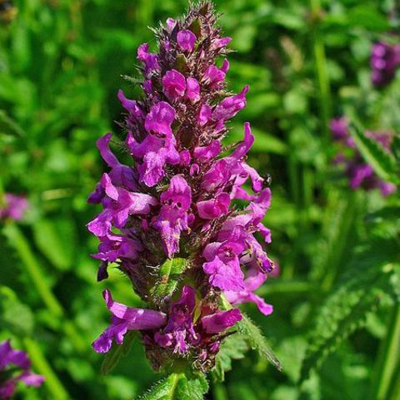

Plants for Pollinators highlights plants selected by the RHS as scientifically proven to tackle the declines in bees, butterflies and other pollinators.
Betony flowers bloom in spikes of rich wine red and purple, alongside distinct and attractive foliage. Its flowers are also known to attract bees and butterflies and they used to be planted in churchyards for spiritual protection. They grow well in any light, with an affinity for damp soil.
- Type: Perennial
- Height: 30-60cm.
- Flowers: June-August
- Soil Requirement: Moist but well-drained
- Light Requirement: Full sun or partial shade
- Natural Habitat: Grassy meadows, river banks
- Also known as: Bishops’s Wort, Wood Betony, Common Hedgenettle
This item is currently unavailable
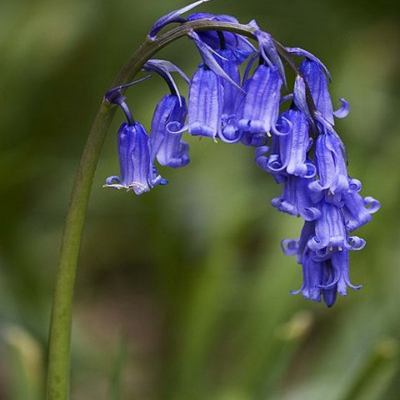

Plants for Pollinators highlights plants selected by the RHS as scientifically proven to tackle the declines in bees, butterflies and other pollinators.
What else is there to say about the dainty azure arcs of the beloved Bluebell? Though they take several years to develop from seed, fully grown bluebells naturalise quickly and can multiply over time, leaving your garden awash and aglow with the famous fairy-tale flora! In addition, Bluebells can rarely grow in pink and white.
- Type: Perennial
- Height: 30–60cm.
- Flowers: April-June
- Soil Requirement: Well-drained
- Light Requirement: Partial shade
- Natural Habitat: Woodlands, hedge banks
- Also known as: Bell Bottle, Cuckoo’s Boots, Witch’s Thimbles
This item is currently unavailable
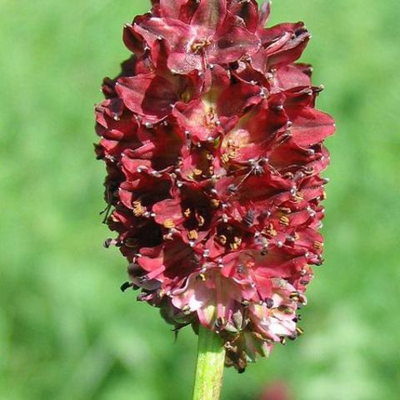

Plants for Pollinators highlights plants selected by the RHS as scientifically proven to tackle the declines in bees, butterflies and other pollinators.
The Great Burnet is a lively-looking plant, sporting crimson flower clusters atop tall, branching stems with distinct jagged leaves. They’re highly attractive to pollinators, and for a good reason; this wild-growing relative of the rose is not to be overlooked!
- Type: Perennial
- Height: 45-90cm.
- Flowers: June-September
- Soil Requirement: Moist but well-drained
- Light Requirement: Full sun or partial shade
- Natural Habitat: Floodplains, meadows, riverbanks
- Also known as: Burnet Bloodwort
This item is currently unavailable
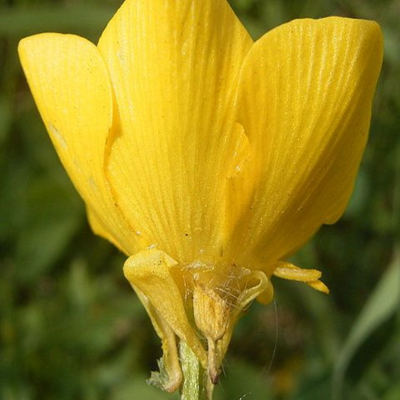

Plants for Pollinators highlights plants selected by the RHS as scientifically proven to tackle the declines in bees, butterflies and other pollinators.
So-named for their swollen underground stem, the bulbous buttercup is a more widespread variant of the iconic glossy-yellow springtime wildflower. Thrives in acidic soil, with good sunlight to best bring out its golden glow.
- Type: Perennial
- Height: 30–45cm.
- Flowers: March-June
- Soil Requirement: Well-drained
- Light Requirement: Full sun
- Natural Habitat: Meadows, grasslands, road verges
- Also known as: Frogs-Foot, Goldcup
This item is currently unavailable
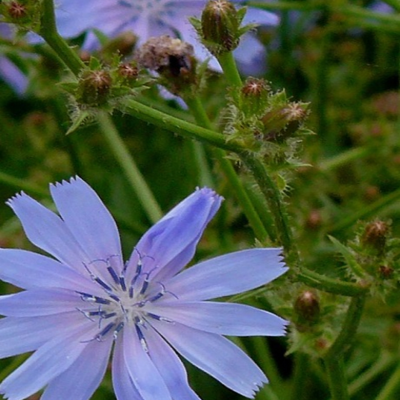

Plants for Pollinators highlights plants selected by the RHS as scientifically proven to tackle the declines in bees, butterflies and other pollinators.
The Chicory is a perfect mix of energetic colour and grace, producing feathery, sky blue petals on thin, branching stems. In addition to making a creative climber, the Chicory’s roots have also seen a wide range of culinary uses, especially as an alternative to coffee - but we think the beauty of its bold blooms are enough of a boost!
- Type: Perennial
- Height: 30–90cm.
- Flowers: June-October
- Soil Requirement: Well-drained
- Light Requirement: Full sun
- Natural Habitat: Fields, road verges
- Also known as: Blue Dandelion, French Endive, Succory
This item is currently unavailable
There is something strangely unforgettable about this flower’s simple-but-unique tiny, baby-blue blooms with rare bursts of pink, and silvery foliage. They’re also perfect for pollinators and have a knack for self-seeding.
- Type: Annual
- Height: 7-25cm.
- Flowers: April-October
- Best Sown: Autumn
- Soil Requirement: Well-drained
- Light Requirement: Full sun
- Natural Habitat: Road-sides, dry grasslands
- Also known as: Blue Mouse-Ear, Scorpion Grass
This item is currently unavailable
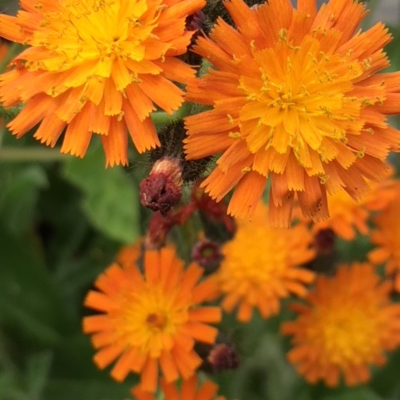

Plants for Pollinators highlights plants selected by the RHS as scientifically proven to tackle the declines in bees, butterflies and other pollinators.
Now here's a foxy flower- literally! Bearing fuzzy-looking, monarch orange flowers with brush-like edges, with stems covered in black hairs, it's easy to compare this low-maintenance wildflower to a fox leaving its den- and the clusters of new flowers which open beneath it to its shy, newborn litter of cubs!
- Type: Perennial
- Height: 15-30cm
- Flowers: June-September
- Soil requirement: Well-drained
- Light requirement: Full sun or partial shade
- Natural habitat: Meadows, embankments, road verges, stony wasteland
- Also known as: Devil's Paintbrush, Golden Mouse Ear, Grim-the-Collier
This item is currently unavailable

Plants for Pollinators highlights plants selected by the RHS as scientifically proven to tackle the declines in bees, butterflies and other pollinators.
Few flowers match the fairy-tale flair of the foxglove: its towering stems of majestic magenta bells feature heavily across myths as a source of healing and protective magic, and a favourite of fairies- we can’t confirm if that’s true, but they are a favourite of bees and butterflies! Best grown in the back of a border to frame other flowers. Make sure to handle with gloves.
- Type: Biennial
- Height: 60–150cm.
- Flowers: June-September
- Soil Requirement: Well-drained
- Light Requirement: Full sun or partial shade
- Natural Habitat: Forest borders, footpaths
- Also known as: Dragon’s Mouth, Fairy Bells, Thimble Flower
This item is currently unavailable
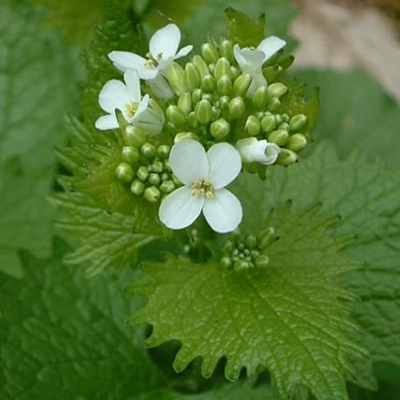

Plants for Pollinators highlights plants selected by the RHS as scientifically proven to tackle the declines in bees, butterflies and other pollinators.
Produces pearl white, four-petalled flowers and distinctly toothy heart-shaped leaves which provide the plant its name, as they smell like garlic when crushed. Its leaves are good for culinary usage, but its flowers make an excellent dressing for the garden, with their star-like petals sprinked beneath a bush creating a delectable display.
- Type: Biennial
- Height: 30-80cm.
- Flowers: April-July
- Soil Requirement: Well-Drained
- Light Requirement: Full or partial shade
- Natural Habitat: Woodlands, hedgerows
- Also known as: Jack-By-The-Hedge, Hedge Garlic
This item is currently unavailable
Choosing different wildflower plants by species gives you complete control over when you plant them, where you plant them and what the end result will be. And buying wildflower plug plants instead of seeds, means that you don't have to wait for them to germinate - perfect if speed is of the essence!
The full range of over 100 British wildflower plants species from Boston Seeds is available to buy online in trays of 25, 150 and 500 plug plants and all are available with nationwide delivery.
Want to learn more about the likes and dislikes of your favourite wildflower plants? Our handy wildflower species quide will tell you all you need to know - yours to download and keep for FREE.
Buy With Confidence

